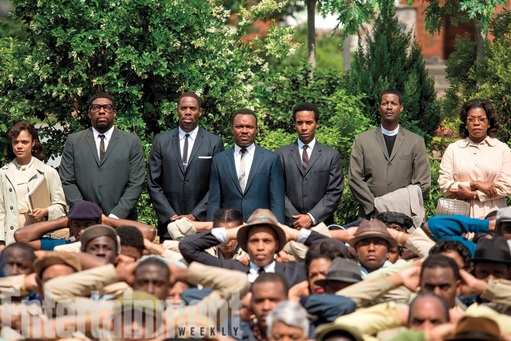Selma chronicles a tumultuous three-month period in 1965 when Dr. Martin Luther King, Jr. led a dangerous campaign to secure equal voting rights using the deeply segregated Selma, Alabama, as a staging ground. Despite hosting African-American majorities, many counties forcibly excluded those members of the community from voting by submitting them to unreasonable requirements, such as requiring that any new voter have a currently registered voter as a sponsor (impossible in communities where zero African Americans were registered) or requiring unreasonable poll taxes. To protest the inability of blacks to vote in many Southern counties, King and members of the Southern Christian Leadership Conference (SCLC) led a 54-mile march from Selma, Alabama, to Montgomery, the state capitol.
I will say, however, my underwhelmed reaction came primarily from the esteemed importance each scene felt to convey. Of course I want each scene to be relevant and intriguing and purposeful; but it was tiring that every scene seemed to have a great weight attached, as if each single scene was attempting to be its own short film. I agree that scenes must feel necessary and essential to my understanding; I just didn’t love the consistently heavy pace. Having said that, I know it’s a heavy story. People weren’t allowed to vote and therefore have a right to self-determination; they were kept from meaningfully participating in their communities. All white juries convicted African-Americans of crimes because only those registered to vote could sit on a jury; regardless of their guilt or innocence, it is clear they were not heard. Many powerful, heart-wrenching, bold images made that clear throughout the film.
Selma beautifully conveys just how difficult—in the face of human suffering, loss, and doubt—a certain historical outcome may be to achieve. Leaders stumble, change their minds, and react in unmeasured ways; these elements of historical narrative are often forgotten in favor of canonizing the great. Given King’s historical stature, I appreciated the reminder that he, like many other historical figures—and, you know, humans in general—had doubts about his goals and ways in which to accomplish them. He is a person, not just a statue.
Grade: B

 RSS Feed
RSS Feed
